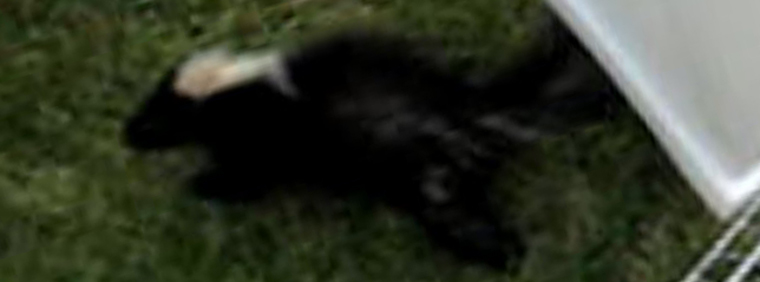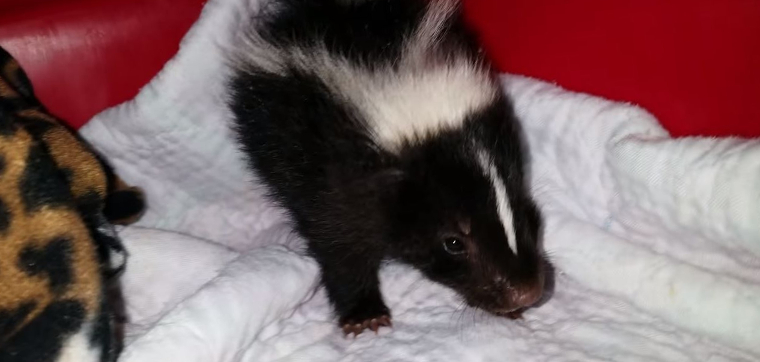-
info@aaanimalcontrol.com
Call us for help in your town
Humane Wildlife Education
What Should I Do If I Find An Orphaned Baby Skunk Wandering About?
Need skunk removal in your hometown? We service over 500 USA locations! Click here to hire us in your town and check prices - updated for year 2020.
Skunks are born blind and deaf, and will not even open their eyes until they are around three weeks old, so if you do find a baby skunk wandering about it will usually be at least a month old. If a skunk has been orphaned, then it has very little chance of surviving in the wild without assistance, but it is important that you take the right steps quickly in order to ensure that the baby skunk has the best chance of survival.

Ensure The Animal Has Been Orphaned
If you have seen the carcass of a female skunk nearby, or you are aware of a female skunk dying nearby, then you can look to take action immediately, although often the best option is to take a step back and to give the baby a chance to be recovered by its mother. In some cases it may have just wandered away from the nest, so it is best to monitor the animal for around an hour or so before you start to take action, and you certainly do not want an angry female skunk to find you taking its baby.
Hydrating The Animal
When you identify that there is no other option but to try and help the skunk, make sure that you place it carefully into a cardboard box lined with a towel of soft material, and place it in a warm room to try and bring the animal's temperature gradually up. If you cannot immediately transfer the animal to a wildlife rehabilitator, then you can use a warm pedialyte solution to try and rehydrate the animal. Make sure you receive guidance before trying to do this.
Should You Feed The Baby Skunk?
The important thing to avoid doing after finding an orphaned baby skunk is not to feed the animal, as this can often do more harm than good. Most food found in a domestic home, and liquids such as cow's milk are actually a hazard to the animal.
Getting The Baby To A Wildlife Rehabilitator
There are directories online and at your local veterinary practice which can point you towards a wildlife rehabilitator who will be able to help you with the baby skunk. It is important to get the animal to an expert as soon as possible, as this isn't a species that can be effectively raised by people without the appropriate training and experience.
Need skunk removal in your hometown? We service over 500 USA locations! Click here to hire us in your town and check prices- updated for year 2020.
In the spring, breeding season starts for skunks. This can start as early as February, usually ending sometime in March, but the season does vary from state to state and region to region. Two months later, successfully-mated females will give birth to live young, up to ten of them at a time. Referred to as kits, skunk babies are the same size as baby mice when they are born, and although have some black and white patterns on their skin, are entirely naked. You'd hardly believe that a newborn skunk and an adult skunk were the same species.

Alongside being naked, newborn skunks are also blend and deaf. Within a couple of weeks, their tiny one-ounce body will have doubled in size, and at just two weeks of age, they are covered in fur. They will also have more than doubled their size and weight once again.
It won't be until about three weeks of age that the kits will be able to open their eyes, and it's not long after that they feel brave enough and able enough to start pottering around. At this age, they can take on the stance that they would take if they were to spray prey or an attacking predator, but nothing happens quite yet.
At seven or eights weeks of age, the young skunks will be taken outside by their mother for the first time, and not long after that, they are considered fully-weaned. They're also getting braver still, making more and more moves to suggest they will soon be ready to leave the comfort and safety of their mother behind.
At about a year old, the young skunks are considered to be sexually ready, although it is believed that males may start getting ready before their female sisters. Skunks can normally spray before this point, and start learning the skill at a very early age. It may even be a skill that the mother encourages as she takes them on their first quests out in the big wide world.
Skunks hone their spraying technique over time, so young skunks are not going to have the best aim, nor will they have the greatest handle over their spraying action. Younger skunks may spray when older skunks may hold out for a bit longer, knowing that running away will prevent them from having to use their precious foul-smelling liquid. Whatever liquid is used needs to be replenished, and this takes time. If the store is diminished completely, the skunk has no defense against predators.
Young skunks look exactly the same as their older, more experienced counterparts, with the exception of being a little smaller. Many people wouldn't be able to tell the age of a skunk just by looking at it, so you can't know whether or not the creature will be young and inexperience, therefore, not likely to hit you with the awful stench, or if the skunk is older, wiser, and more experienced, with just the right amount of skills to hit you head on. Remember — skunk spray is notoriously bad to get rid of, and it smells truly awful too.
For more information, you may want to click on one of these guides that I wrote:
How much does skunk removal cost? - get the lowdown on prices.
How to get rid of skunks - my main skunk removal info guide.


















